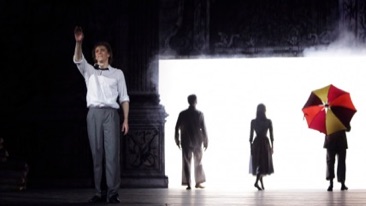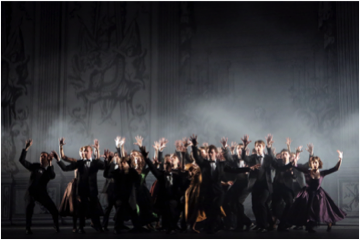See also
Please do comment on my Twitter or Facebook page
Urin admits he’s become conservative
Arts fight threat of state censorship
Medinsky: ‘Russia protects Shakespeare from paedophilia’
13 MAR 15 The first reactions are in to the world premiere this week of the Bolshoi Ballet’s new contemporary creation, Hamlet, directed by British director Declan Donnellan of Cheek By Jowl and choreographed by Radu Poklitaru, who has strong Ukrainian affiliations.
Izvestia’s correspondent is cautious of expressing any judgement of approval or criticism, but the headline and the comments below the article focus on the invasion of the stage at the end by unmarked uniformed soldiers dressed like the mysterious military personnel in green representing Russian interests in the current eastern Ukraine occupation.
Moskovsky Komsomolets’s Pavel Yashenkov complains that there is hardly any choreography in the ‘ballet’, that it is more of a play without words, ‘food for thought’. He refers to Christopher Wheeldon’s ‘too abstract’ ballet on Hamlet for the Bolshoi, Misericordes, and versions by Boris Eifman, Robert Helpmann and Bronislava Nijinska among others, as evidence of the chequered past of Shakespeare’s great tragedy in any dance version. I’ll translate his long review soon.
That the Donnellan/Poklitaru team were invited to work with the Bolshoi this season has been provocative, as their revision of Romeo and Juliet (excoriated by London critics, including me, on a Bolshoi tour) reportedly upset Prokofiev’s descendants, who withdrew permission for them to use the celebrated score.
Sergei Filin, the battered ballet director, insisted on the new Hamlet going ahead this season, even as the administration have been retailoring the Bolshoi repertoire for more nationalist and traditionalist preferences during the Ukrainian crisis. Poklitaru, though he now runs a modern ballet troupe in Kiev, was the chief choreographer for the Sochi Olympics ceremony.
The phrase ‘polite people’, by the way, was coined last year (as reported by the BBC) to describe the unmarked green-uniformed militiamen who appear to have been running everyday life in eastern occupied Ukraine.
Here’s a translation of the Izvestia report.
A troop of ‘polite people’ invades the Bolshoi Theatre
Izvestia, March 12, 2015, 20:49, by Olga Zavyalova
In Radu Poklitaru’s new ballet, Hamlet is accompanied on his final journey by armed men in camouflage
The premiere of a ballet on Hamlet by Radu Poklitaru, founder and director of the Kiev Modern Ballet, and the British director Declan Donnellan took place on the Bolshoi’s New Stage.
This creative duo has long been familiar to Moscow: in 2003 Poklitaru and Donnellan staged a Romeo and Juliet at the Bolshoi, to Prokofiev’s score. But the shocking production, in which Juliet was a sports athlete and Tybalt in love with Mercutio, vanished from the theatre repertoire. According to Poklitaru, the composer’s relatives, unhappy about the edits to the music and changes to its scenario, forbade further showings.
The Bolshoi Ballet artistic director Sergei Filin asked Poklitaru and Donnellan to put on another Shakespearean ballet at the country’s main theatre. The story of the prince of Denmark has not been recast as radically as Romeo and Juliet. The principal change is the transferring of the action into the middle of the 20th century, which has had an influence fundamentally on the setting.
The directors decided to set the ballet to the music of Dmitri Shostakovich, though they ignored two of his well-known Hamlet suites (music for the 1932 production by Boris Zakhavi and for the Grigori Kozintsev film), choosing instead the 5th and 15th symphonies. The drama in this production follows the music, and the choreography follows the drama.
A predominance of choreographed episodes and mime over pure dance proved beneficial to the older generation of the company’s dancers, who distinguished themselves brilliantly. The Danish king (Viktor Barykin), Claudius (Yuri Klevtsov) and Polonius (Alexander Petukhov) eclipse Hamlet (Denis Savin) and Ophelia (Anastasia Stashkevich) with their expressiveness and the emotional weight of their gestures.
Pure dance is also overshadowed by the special effects, on which the producers have not stinted. The action, less than an hour and a half long, includes revolver shots (including from within the auditorium), a duel with rapiers, and silent movie video elements. In one scene in the first act Hamlet himself makes a film: he holds a camera, projecting the picture onto a screen in real time.
But the most surprising change happens in the finale of the ballet: at the moment when Hamlet dies, a group of people in unmarked military uniforms occupy the stage with automatic rifles in their hands. In 2009 Radu Poklitaru told Izvestia that “war, politics and pretty much all current events aren’t good themes for art”. Now, evidently, he and Donnellan think differently: they close the saga of mental anguish and love with a mise-en-scène that has no connection with the action gone before it, but pays tribute to the present day.
Evgeniy Plyushchenko at the Turin Olympics
First reactions to Donnellan & Poklitaru's Hamlet ballet

"A critic complains that here is hardly any choreography in the ballet - it is more of a play without words"

